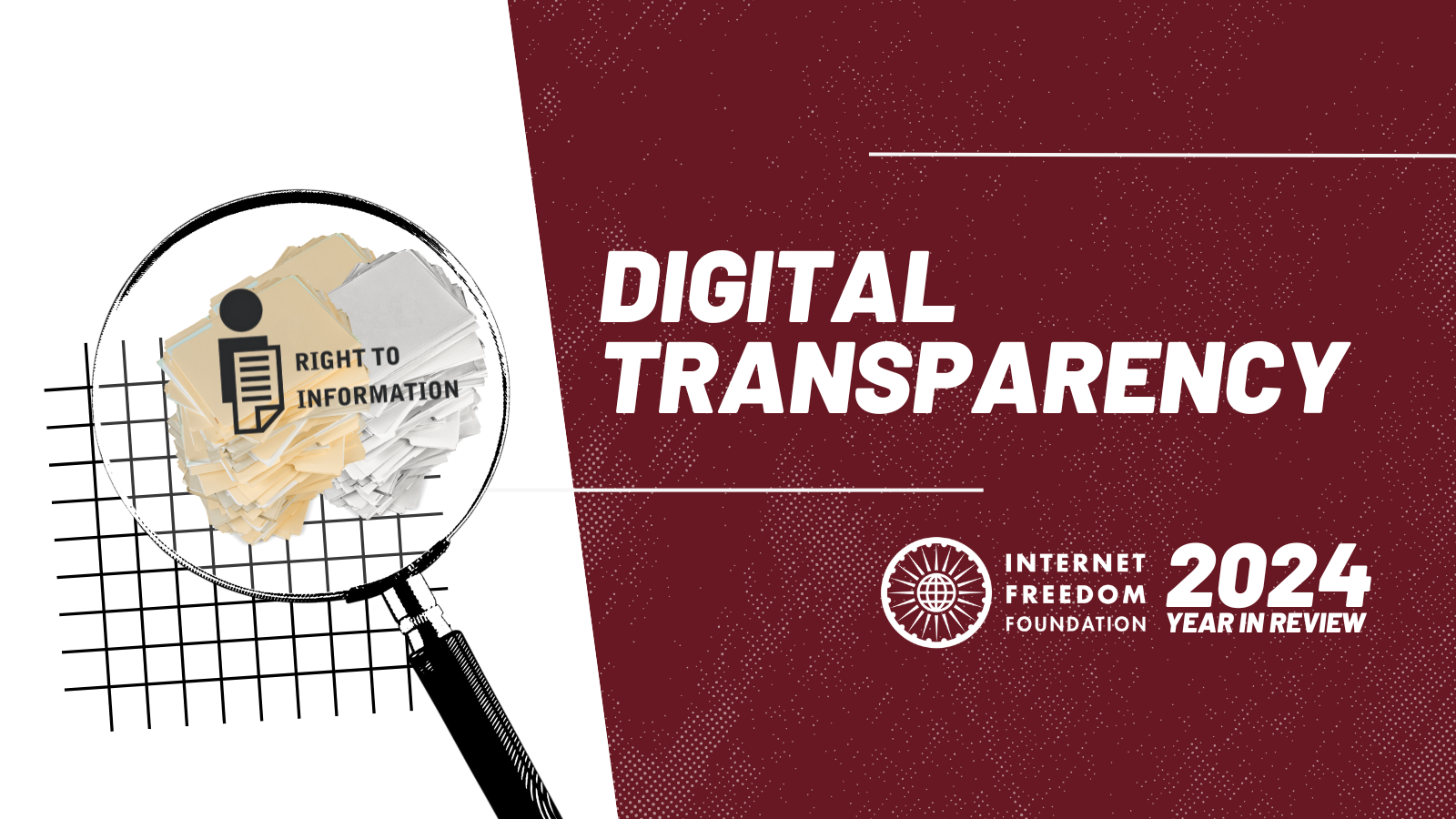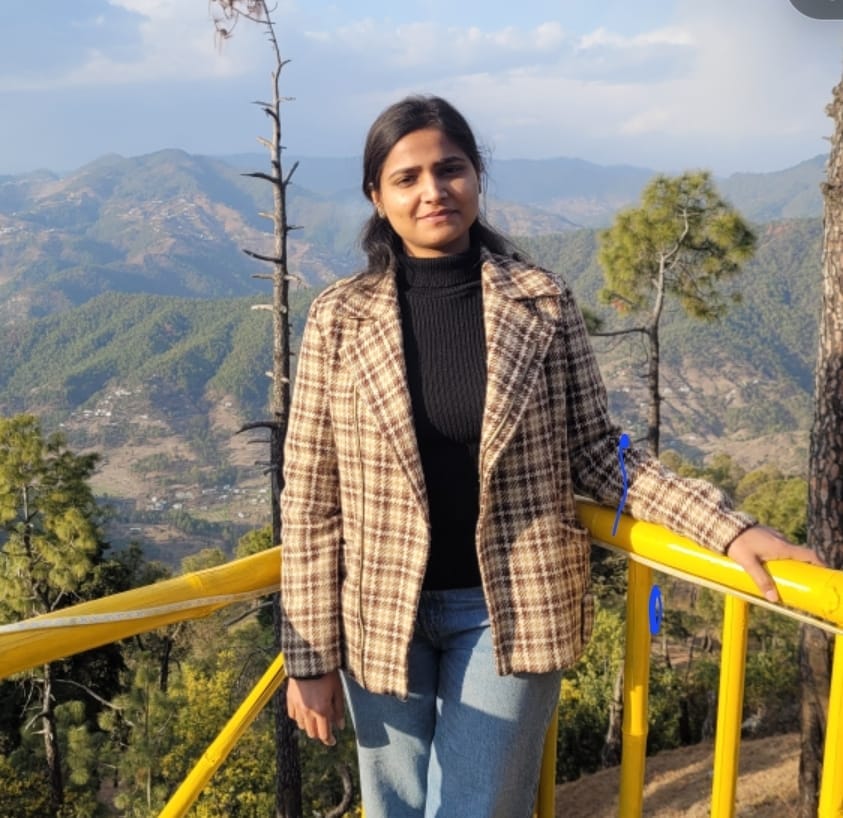
tl;dr
In 2024, we filed 511 Right to Information applications (“RTI”) on surveillance, AI deployment, content takedowns, and other digital rights issues. We also filed 68 first appeals with various public authorities at the state and Union levels, and 5 second appeals before the Central Information Commission (“CIC”) in matters relating to surveillance and fact check units. We uncovered some big revelations through our transparency endeavours, read more in our yearly update.
Why should you care?
The Right to Information Act, 2005 (“RTI Act”) was designed to promote transparency and accountability in government functioning. At IFF, armed with nothing but a pen and an unshakable sense of curiosity, we leverage this powerful tool through our Digital Transparency vertical to demand answers on critical issues impacting your digital rights. With over 500 RTIs filed, we inquire about internet shutdowns, surveillance, content takedowns, and how your digital rights are being safeguarded. The information we uncover often serves as the foundation for government dialogue, advocacy, and strategic litigation.
What we learnt (or did not?)
We filed several RTIs on public consultations, we tracked news headlines and emerging government schemes, and made measured RTI interventions on a number of concerning initiatives. Here are some key responses we received to our RTIs this year:
Transparency in public consultations
- The Broadcasting Bill : After media reports on the Ministry of Information and Broadcasting (“MIB”) withdrawing the Broadcasting Bill, 2024, we filed an RTI to obtain details on closed-door consultations. The response provided some information but did not address the 2024 Bill or stakeholder concerns.
- Telecom Rules, 2024 : Additionally, the Department of Telecommunication notified four key telecom rules under the Telecommunications Act, 2023, without publishing the stakeholder responses received during public consultation. We filed an RTI requesting an exhaustive list of all submissions received during the public consultation process for which we are still awaiting a response.
Dubious AI: Big Claims, No Clarity in Responses
This year, we specifically focused on the deployment of AI in governance and surveillance, filing multiple RTIs to uncover details about its use, the technologies involved, and any regulations or guidelines governing their implementation:
Here is a round-up of the relevant responses:
- To understand the nature of the relationship between technology provider Staqu Technologies Pvt. Ltd. and state departments within the state government, we filed multiple RTIs with 27 state governments and the Ministry of Law and Justice. The responses that we have received till now have varied—some states have denied having any agreement with Staqu Technologies like Jharkhand, Chhattisgarh, Manipur, Bihar, Tripura and Kerala; on the other hand, states like Uttar Pradesh, Tamil Nadu, Himachal Pradesh and Gujarat have replied by stating that information is not available with the state department. Till now, only the Haryana government confirmed that Staqu was empanelled with HARTRON in 2019 for software development and implementation for state departments. However, the contract expired in February 2021, and Staqu was not involved in any ICT projects during this period. We also asked the ECI about their partnership with Staqu Technologies Pvt. Ltd. as is claimed on the latter’s website.
- DD Kisan, a government TV channel dedicated to farmers, launched two AI anchors, AI Krish, and AI Bhoomi. We asked Prasar Bharti for the specifications of the AI technology used in developing these AI models and if any regulations are in place to govern the use of AI in broadcasting. Prasar Bharti responded by denying information to all of the queries under Section 9 of the RTI Act which apparently involves information pertaining to commercial confidence, intellectual property, and or trade secrets.
- It was reported that the Tamil Nadu Forest Department was installing AI-based tracking and detection systems near railway tracks to prevent elephant deaths. We asked about the status of the project and the AI technology being used in the project. According to the response, the AI system in place was mainly for thermal detection via motion-detecting camera and this helped in early detection of animal movement near railway tracks. The budget allocation for this project is a whopping Rs. 7.24 crores.
- We filed an RTI with the Lucknow Police about reports of AI cameras designed to detect women’s emotions and alert authorities to potential threats. We asked about the project’s status, guidelines for using such cameras, and how the data would be handled. The Lucknow Police responded that the cameras are only used for traffic surveillance and do not detect emotions. Strangely, the response came from a private company, Technosys Integrated Solutions Pvt. Ltd., not the police, which raises questions about who is actually managing this project.
The APAAR ID saga
The Ministry of Education and the Ministry of Electronics and Information Technology (“MeitY”) implemented the Automated Permanent Academic Account Registry (“APAAR ID”), which is an initiative that aims to assign students unique IDs linked to their Aadhaar numbers. The APAAR ID system presents significant risks, especially in the collection and handling of minors' sensitive data, including personal and academic information, without adequate legal safeguards. On April 26, 2024, we filed an RTI request specifically requesting a document titled "Schooling: Access and Quality," presented by the Minister of Education at the National Conference of Chief Secretaries in December, 2023. So far, our RTI request has been transferred over 30 times (!) between various departments. We received a partial response concerning the National Education Policy, which merely directed us to a website without addressing the specifics of the document we requested or answering our APAAR ID related queries. We continue to face evasion and a lack of clarity from the government on this issue. Read more about this here.
Even though APAAR ID is advertised as voluntary, our concerns about the APAAR ID intensified as reports surfaced of schools coercing parents into signing consent forms without providing an opt-out option, coupled with the release of a questionable Privacy Policy (read more here).
On November 18, 2024, we filed RTIs with the Central Board of Secondary Education (“CBSE”), Delhi Education Department, and the Karnataka Education Department enquiring if any circulars were issued to schools (directly or indirectly) directing them to mandatorily seek consent from the parents. Unsurprisingly, the Union government repeated its previous trend as CBSE transferred the RTI to the Department of School Education and Literacy, which in turn transferred the RTI back to CBSE. The Delhi Education Department transferred the RTI to the Directorate of Education, who further transferred the same to zone-wise government schools. The government schools shared a circular, letters from the Secretary and Additional Secretary, Ministry of Education instructing schools to organise "special parent-teacher meetings" to try to convince the parents to give consent. We have only received transfers from the Karnataka Education Department so far. We will keep you updated!
Censorship, and content takedowns
We actively monitored government censorships and takedowns and filed RTIs to uncover more about the government’s rampage against freedom of speech and expression. Here is a roundup of the relevant responses:
- Elon Musk's media outlet revealed that the Election Commission of India (“ECI”) issued takedown orders against tweets violating election conduct rules, i.e. the Model Code of Conduct. We filed seven RTIs with the Election Commission of India (“ECI”) regarding content takedown orders issued to various social media platforms. A month later, the ECI confirmed issuing 55 takedown orders but refused to provide copies, citing Section 8(1)(j) of the RTI Act with reference to Vihar Durve v. CPIO, CIC/ECOMM/A/2022/63217. They simply referred us to the "Handbook for Media Matters" for content criteria details. The ECI's content takedown orders raise concerns about free speech, censorship, and the need for safeguards to ensure its impartiality and protect democracy. We also filed first and second appeals.
#WhatTheBlock
— Internet Freedom Foundation (IFF) (@internetfreedom) April 17, 2024
In takedown orders dated April 2nd & 3rd, @ECISVEEP asked @X (formerly Twitter) to take action against 4 “objectionable” posts containing “political speech shared from elected politicians, political parties, and candidates for office”. 1/11 pic.twitter.com/FupuAqVmQU
- We filed a number of RTIs on censorship efforts during the Ram Temple consecration ceremony in Ayodhya. We asked the Ministry of Home Affairs about the blocking of 100 social media accounts ahead of the Ram Temple consecration ceremony and real-time monitoring of social media websites by a “cyber experts group”. The response stated that takedowns were conducted under Section 69A of the Information Technology Act, 2000, and the Information Technology (Blocking Access to Information) Rules, 2009. They also claimed confidentiality under Rule 16 of the 2009 Blocking Rules, and Section 8(1)(a) of the RTI Act.
- We asked MeitY for a breakdown of account takedown and global takedown orders issued to significant social media platforms. MeitY responded to us (see here, here and here) with information pertaining to the total number of blocking notices issued and a year-wise breakdown of the same, although no additional relevant information nor copies of such deliberations were provided, citing exemptions under Section 8(1)(a) of the RTI Act.
- Prasar Bharti censored speeches of two opposition leaders during their televised addresses on Doordarshan and All India Radio ahead of the 2024 Lok Sabha elections. We asked Prasar Bharti and the ECI about the rules governing the censorship, the criteria used, which provisions of the Model Code of Conduct were invoked, and details about the ad hoc script vetting committees. Prasar Bharti responded that they follow the Akashvani Broadcast Code and the ECI's Model Code, with scripts vetted by ad hoc committees, without providing any further details. The ECI simply referred us to the Model Code.
CCTV in hospitals: storing data without safeguards
After the R.G. Kar hospital rape case, the Ministry of Health and Family Welfare issued a directive for deployment of CCTVs in hospitals. We filed an RTI with the Ministry of Health and Family Welfare to gather more information on the project. The responses were received from several prominent hospitals, including AIIMS MP, AIIMS Delhi, Lady Harding Medical College, AIIMS Raipur, AIIMS Bhubaneswar, JIPMER Puducherry, and others, reveal troubling practices surrounding the deployment of CCTV cameras with AI and Facial Recognition Technology (“FRT”). While AIIMS MP and Lady Harding Medical College confirmed they do not use FRT, AIIMS Raipur and AIIMS Patna acknowledged the use of AI-enabled cameras capable of FRT, though without clear confirmation of implementation. JIPMER Puducherry also admitted to using AI, though they declined to specify the technology used. Concerns arise from the storage of CCTV footage, with hospitals storing data for periods ranging from 30 to 33 days, but without disclosing where this data is kept. AIIMS Delhi stated that the data will be stored for 30 days, but the storage location was not revealed. AIIMS Bhubaneswar also informed that data is stored in a centralized CCTV control room, with a backup retention period of approximately 30 days. The lack of clarity on data protection measures raises alarm, especially since these hospitals are collecting and storing sensitive patient information without adequate data protection and AI regulations in place.
Digital media policies
After reports on Uttar Pradesh's Digital Media Policy, 2024, we filed an RTI for the policy document and consultation details, as it had not been publicly released. But this was not the only one to exist. Our research uncovered similar policies in MIB and other states, leading us to file additional RTIs to evaluate their transparency, accountability, and impact on freedoms, including the effect of incentivizing influencers to promote government schemes:
- We filed RTIs with MIB, Haryana, Punjab, and Himachal Pradesh for more information.
- Media reports also indicated Rajasthan, Assam, and Sikkim had started influencer empanelment processes for promoting government schemes, but their policy documents were not accessible, so we filed RTIs with these states as well (see here, here and here).
- Similarly, Madhya Pradesh and Meghalaya also came out with distinct policies focused on tourism or welfare ads, excluding social media. In response, Madhya Pradesh confirmed starting influencer empanelment but did not address digital entities in its 2022 policy. Goa shared details about empanelled influencers, budget allocations, and noted no public consultation before implementing its policy.
The fact-check fight
To combat misinformation and fake news, several Indian states have started constituting state-level Fact-Check Units (“FCU”) or other authorities. To seek clarity on how these states are addressing fake, false, and misleading information we filed two separate RTIs with all the States and Union Territories – first, asking them about the efforts and steps taken by them to regulate the dissemination of fake, false, and misleading information, and the second, asking the States about the establishment of any other authority, to regulate the dissemination of fake, false and, misleading information.
Most states either redirected the RTIs or denied the existence of FCUs. However, Gujarat responded to two RTIs from the PIO, Office of the Additional Director General of Police, and the Cyber Crime Cell, refusing to provide the information due to an exemption under a Home Department notification. Similarly, Meghalaya cited an exemption under a state government notification for the Criminal Investigation Department. Both states applied the same exemptions to subsequent RTIs, prompting us to file first appeals (here and here).
Government’s sealed lips
We filed several other RTIs based on news reports on surveillance, excessive data collection, privacy concerns, and other digital rights issues. Unfortunately, sometimes the activity is fruitless as we either never receive a substantive response, or any response at all. Enumerated below are some of such RTIs we filed on important digital rights issues:
Unmasking Censorship: RTIs on the Government's content takedown tactics
We observed that the government has ordered the take down of various articles, websites, YouTube channels, and videos in an attempt to censor the content on public platforms. We held the government accountable by asking as many questions regarding the legality, grounds and reasonability of such orders through our RTI requests. The list of these takedowns and our RTIs to MeitY and MIB is here:
- We asked MeitY and MIB about the takedown of Bihar railway worker protest videos from YouTube (see responses here and here).
- We asked MeitY and MIB about the suspension of Media Swaraj channel from YouTube (see here).
- We asked MeitY and MIB about X/Twitter accounts blocked during the Farmers’ Protests in February 2024 through 12 separate RTIs. We maintained a tracker for these blockings and our RTIs.
- We asked MeitY and MIB about the takedown of the Caravan Magazine story ‘Screams from the Army Post’ (see responses here and here).
The responses were more than underwhelming as they stated that the takedown is done under Section 69A of the Information Technology Act, 2000, read with Part III of the Information Technology Rules, 2021 (which is currently under challenge in the Delhi High Court, read more here), and Information Technology (Procedure and safeguards for blocking for access of information by public) Rules, 2009. The responses also state that the information is confidential claiming exception under Section 8(1)(a) of the RTI Act.
And some more..
- Police in Kupwara, Jammu and Kashmir, reportedly used GPS trackers on two drug-related crime suspects released on bail (see RTI here).
- The Ministry of Home Affairs installed a “high accuracy” CCTV camera in Ayodhya during the Ram Temple consecration ceremony (see RTI here, and response here).
- The Agartala Food and Civil Supplies department requires Aadhaar e-KYC via fingerprint verification for ration card holders (see RTI here).
- The Central Board of Indirect Taxes and Customs mandated biometric Aadhaar authentication for certain GST registrations (see RTI here).
- In the budget session, the Union government announced the Unique Land Parcel Identification Number initiative under Digital India Land Records Modernisation (see RTI here, and response here).
First Appeals
In 2024, we filed a total of 68 first appeals. Some notable ones are summarised below:
- We requested information from the ECI regarding content takedown orders issued to social media platforms. The ECI responded stating that takedown orders were only issued to Google, Facebook, X, and Instagram, but refused to provide copies citing confidentiality under Section 8(1)(j) of the RTI Act, referencing Vihar Durve v. CPIO, Election Commission of India. In response, we filed four first appeals (see Facebook, X, Google and generic), arguing that the referred case had a broader scope and that access to these orders is crucial for identifying violations and challenging them in court.
- Gujarat and Meghalaya responded to our FCU RTIs, with Gujarat’s PIO denying access based on a 2005 Home Department notification, and Meghalaya’s PIO citing a 2024 state notification exempting information under the Criminal Investigation Department. Both states raised similar exemptions for the second FCU RTIs as well. We filed first appeals, arguing that despite Section 24's exemption, allegations of corruption and human rights violations must still be disclosed under the proviso to Section 24(4). However, the First Appellate Authorities upheld the decision of the PIO (see here, here and here).
Second Appeals
For the ECI takedown RTIs, we filed the first appeals for the generic response as well as the responses relating to Facebook, X, and Google as the information given was inadequate and incomplete. On June 28, 2024, the ECI First Appellate Authority upheld the response of the CPIO and also cited Section 8(1)(j) of the RTI Act, 2005, relying on Vihar Durve v. CPIO, Election Commission of India (Facebook, X, Google, generic). In September, we filed four second appeals (Facebook, X, Google, generic) for all four responses respectively. We are waiting for a hearing date from the CIC.
Chief Information Commissioner: no further intervention required in our Second Appeal
On March 16, 2023, we filed RTIs with MeitY seeking information on compliance with Direction (iii) of Direction No. 20(3)/2022-CERT-In. Direction (iii) addresses issues posed by data breaches, directing information to be provided in order to take proactive and preventive measures against such incidents. MeitY initially disclosed that only VPN service providers were issued notices seeking compliance with Direction (iii) and that the information sought is “mostly related to unspecified third parties”. However, they refused to share any further information, including. Even after filing a first appeal, MeitY refused to disclose information, stating that an appropriate reply had been given by the CPIO and disposed of the matter under Section 8(g) of the RTI Act. Dissatisfied with this response, we approached the CIC, where the Chief Information Commissioner noted that any information permissible for disclosure under the RTI Act had been provided and as such, no further intervention was warranted.
So, what’s next?
Well, we were able to file almost double the number of RTIs compared to last year, thanks to our Freedom Innovation Fellows who took over the transparency vertical tasks. Unfortunately, given space constraints we could not discuss all of them here, but you can dive deeper into our transparency work by reviewing our quarterly reports for Q1, Q2, Q3, and Q4. Meanwhile, in the coming year, we will strive to file even more RTIs and expand our transparency work. We aim to keep fighting the good fight for transparent, accountable, and citizen-led democratic institutions. We look forward to receiving responses to the remaining RTIs and will keep you updated, so stay tuned!



